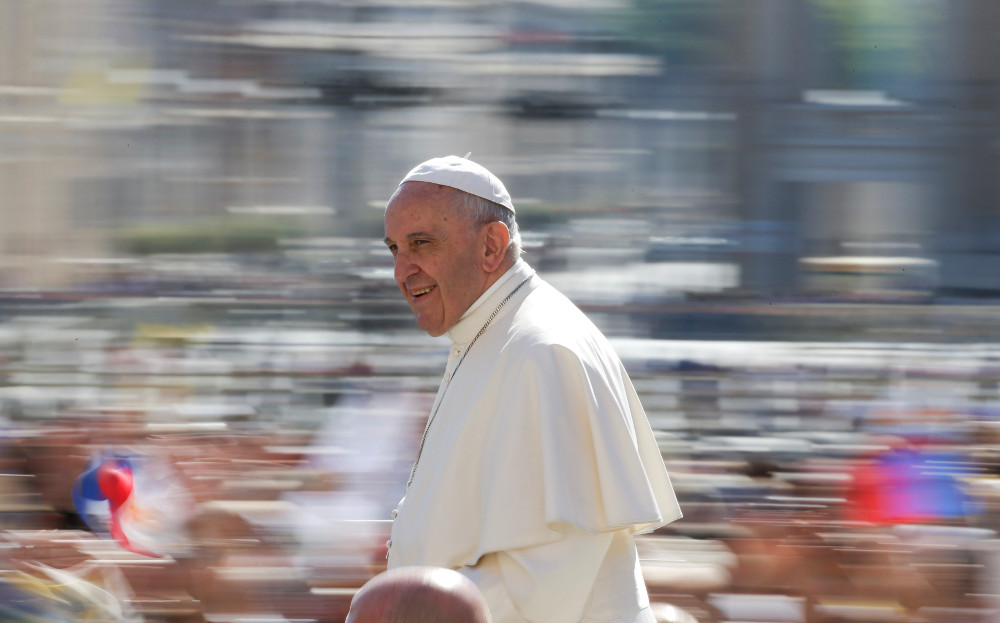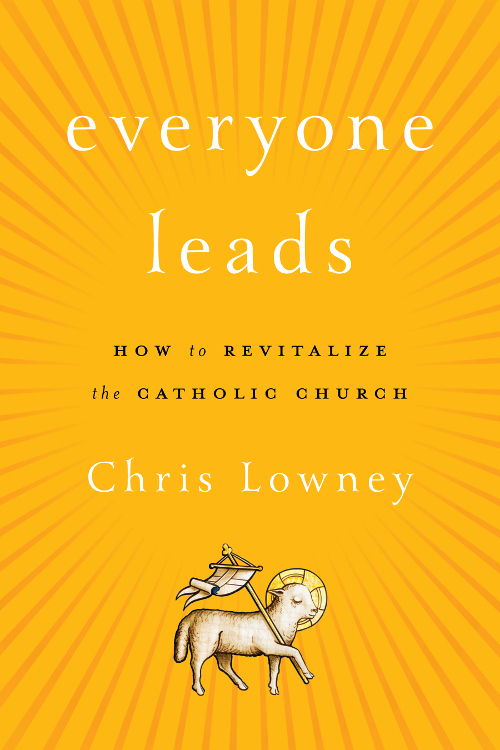
Pope Francis arrives for his general audience in St. Peter’s Square May 17 at the Vatican. (CNS/Reuters/Max Rossi)

Chris Lowney’s new book, this time applying his leadership skills to the current condition of American Catholicism, comes at a time when a lot of the energy for ecclesial reform seems to be taking a breather. On the more progressive wing, the grizzled veterans of Vatican II and Vietnam are just that, veterans, and their energies, like their lifespans, are not endless.
When we add the expectations that Pope Francis has aroused for a more compassionate if not a more liberal church, it is not hard to see why many of the reform groups seem to be relatively quiet for now, waiting for the changes that will satisfy at least some of their cherished hopes.
Among more conservative Catholic movements, it is the Francis papacy itself that seems to both bewilder and frustrate the exigencies of the Ratzinger era. The Benedict option, like the new evangelization, doesn’t seem to be going anywhere, so waiting out this pontificate might be their best option. But all American Catholics of whatever stripe are affected and afflicted by the sense that our church is retrenching, if not declining, and many of us think something should be done before ex-Catholics become simply the largest religious grouping in American society.
Everyone Leads is Lowney’s heartfelt affirmation of all of us who believe that the American church needs change. Waiting is not an option, and if change is to come, and it needs to come, then it is simply up to us. To all of us, progressive and conservative alike, advocates of change and of continuity, Thomists and Augustinians, lovers of Francis and fans of Benedict XVI, the message is clear. Get on with it; take up the reins of leadership that came with your baptismal priesthood.
So everyone leads, not just because that is a structural necessity if we are going to revitalize our church, but because this is simply one aspect of being a baptized Christian. When Francis proclaims us all as missionary disciples, he is saying exactly the same.
There are good books whose underlying message is in accordance with Lowney’s vision, but this book is different in important ways. First, most of the precursor volumes were written by theologians, doing their best to speak more colloquially, sometimes succeeding and often failing. Lowney writes in the simple and direct way of someone who keeps his intended audience clearly in his mind as he lays down his paragraphs.
Second, he expressly avoids taking sides on any hot-button issues or favoring one or other “side” of our somewhat divided church. Everyone will be challenged in some way. For example, while some more conservative Catholics might have problems with the lack of attention to priestly vocations, some of us — me included — will be brought up short by approving references to EWTN and the genius of its founder, Mother Angelica, who created a television network that appealed to everyday Catholics.
And third, no blueprint for the future is even sketched out. The argument is more about process than substance, or rather, the overriding vision of the future is that if we all accept that the future of the church is our personal responsibility, we must find a way to be active in building that future, and all will be well.
Advertisement
So how will this transformation occur? The lessons of the early church will guide us. Everything the first Christians did was done in the power of the Holy Spirit, and what they did was the work of the grassroots church as much as of its leaders.
Read the Acts of the Apostles carefully, advises Lowney, and you will see the work of the unsung heroes who built a church from nothing. And if you read on in the New Testament, you will learn two other important lessons for our times: “The action is at the frontiers, not headquarters,” and the community is fashioned in a challenging blend of change and continuity.
The Gospels aside, the remainder of the New Testament is a picture of a missionary church. And the young church had to address profoundly difficult questions of how to grow, none more so than the decision that it was not necessary to be or become Jewish in order to be baptized a Christian.
None of the issues we face today comes remotely close to that, but the work of Peter and Paul finding their way to such a momentous conclusion should inspire us all to engage in the heart of Lowney’s book, the EASTeR project for church revitalization.
The steps of Lowney’s EASTeR project are mostly familiar. We must become more accountable, be more oriented to serve the needy, seek the spiritual enrichment of ourselves and those with whom we come into contact, and reach out to engage the world. The second half of the book explores these five steps in detail.
Did I say “five steps” and have I only enumerated four? The fifth, actually the first, is to become more “entrepreneurial,” and here is the heart of the solution and also the biggest hurdle to overcome. Catholics on the whole are a fairly passive lot, and this is not a recipe for significant change. Lowney knows this, so the unease that a reader might feel going through the account of the EASTeR project is finally addressed in the concluding chapter. “There are so many great ideas here, but how can we make it happen?” would be a common response. In Lowney’s catchy phrase, “Does culture eat strategy for lunch?” In other words, does the weight of our past impede the possibility of creative steps forward?
Obviously, the future is an open question and Lowney is not working with rose-tinted glasses. The challenge for our bishops and clergy is to call and empower all of us and for the most part to get out of the way. We have to do it. We have unity of faith, but we need courage and creativity to change the way we live it. The lessons of good business practice are all over the book, nowhere more than here. A consistent sense of mission is vital, culture can be an impediment to change, and loosing the imagination of the workforce is the best way forward.
We have the Gospel and that is not going to change. But our new strategy going forward has to take a hard look at the inertia with which culture can threaten us. And while bishops and popes can inspire us, and should, the work of creative strategy is ours to do.
[Paul Lakeland is the director of the Center for Catholic Studies at Fairfield University. His latest book is The Wounded Angel: Fiction and the Religious Imagination.]







